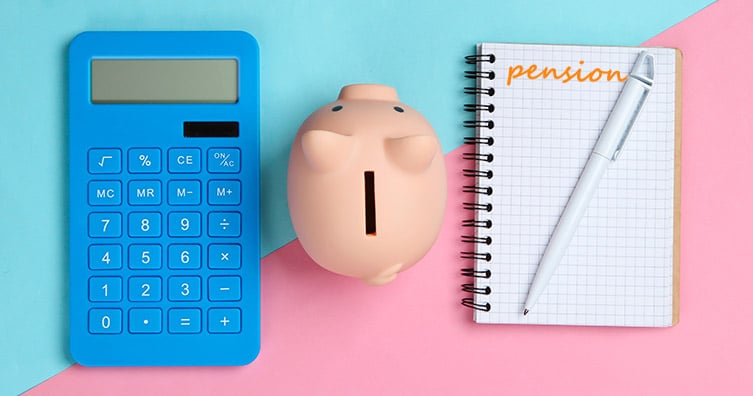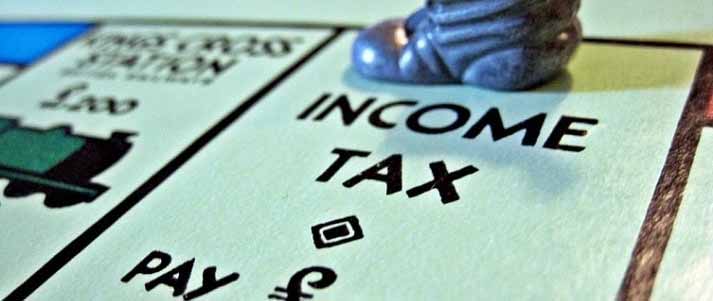How do pensions work?
Whether you're still at uni, a recent grad or preparing for retirement, it's essential to understand how pensions work. Read on for the key things to know, including how and when to start saving.

Credit: Vladimir Sukhachev – Shutterstock
No matter what stage of life you're at, it's never too early to learn how pensions work – not least, when to start contributing towards them and how to maximise your savings.
In fact, we think that advice about pensions should actually be taught in schools. The more prepared you are from a young age, the more it will benefit you later on in life.
Below, we'll go through the 11 main things to keep in mind about pensions to help with your future financial planning.
What is a pension?
A pension is a savings pot for retirement, covering day-to-day living and care costs after retiring from paid work.
There are three main types of pension in the UK: State Pensions, workplace pensions and personal pensions (SIPPs). Most working people today will have at least two of these and will receive tax relief on money paid towards them up to a certain amount.
11 essential things to know about pensions
These are the key things to know about how pensions work:
-
When to start a pension

Credit: Yevgen Kravchenko, kamui29, Bell Photography 423 – Shutterstock
The best time for you to start paying into a pension will mostly depend on your individual circumstances.
For a lot of people in the UK, their pension savings will begin when they're 22 or over (but below State Pension age) and earning over £10,000 a year. At this point, your employer should enrol you on a workplace pension.
However, if you're not yet 22 and earning over £10,000 a year (or even if you are and you'd like to put more money towards your pension), there's an easy way to know how much to contribute...
Here's a general guideline as to how much you should be saving for retirement each year, depending on when you first start your pension:
- Think of the age you are/were when starting your pension savings
- Halve this number, then apply this as a percentage to your pre-tax annual earnings
- That is the percentage of earnings you should be putting towards your pension each year throughout your career.
For example, if you start saving for a pension at 24, you halve this to get 12. So, throughout your career, you can calculate 12% of your pre-tax annual earnings and put this much money towards your pension each year.
But remember, this is a guideline, so it's by no means a strict rule everyone should follow – it can just give you a good idea of how much to save for your pension.
It also shows the benefits of starting a pension young.
The sooner you start, the smaller the percentage of earnings you'd need to contribute each year. This could make a massive difference to your finances in a decade or so when you'll likely have much bigger monthly outgoings (if you have a mortgage and kids, for example).
Is it the right time for you to start a pension?
While it can be a good idea to start paying into a pension at a young age, think carefully about whether it would be the right time for you now, depending on your current financial situation.
For example, if you're struggling with debt, you might want to consider talking to a financial adviser before putting money away for your pension. It may be that, for now, you'll need to focus on paying off any money that you owe first, instead of thinking about your retirement savings.
As we'll explain below, you generally won't be able to access your pension savings until you reach a certain age, so don't put any cash towards it that you're likely to need before then.
-
The State Pension increases each year
You may have heard references to the 'new State Pension' and the 'basic State Pension'.
Men born after April 1951 and women born after April 1953 will receive the new State Pension as opposed to the basic one.
We'll be focusing on the new State Pension in this guide – if this doesn't apply to you, find out more about the basic one on the gov.uk website.The full rate of the new State Pension is currently £203.85 per week (2023/24 rate).
Usually, this figure increases each financial year (which runs from April–April) with the 'triple lock policy'. This means it goes up by whichever is highest out of these three: the average rise in UK earnings as a percentage, the rise in prices as per the Consumer Price Index (CPI) as a percentage, or 2.5%.
Will you receive the full rate of the new State Pension?
You could receive less than the full rate, depending on how long you've been making National Insurance contributions at the point of retiring.
Here's how much of the full rate you could receive based on your National Insurance record:
- To get any State Pension, you'll generally need to make National Insurance contributions for at least 10 years after 5th April 2016.
- To get the full State Pension amount, you'll need to make National Insurance contributions for 35 years after 5th April 2016.
- If you make National Insurance contributions for between 10–35 years after 5th April 2016, you'll receive a proportion of the full rate.
When will you get your State Pension?
The State Pension age is currently 66 for those who are reaching that age now. But it is due to increase gradually to 67, and then to 68, so the age at which you'll be able to access the pension will depend on when you were born.
There's a handy tool on the gov.uk website that indicates what age you'll need to be to start receiving your State Pension.
For other types of pensions, like ones in workplace pension schemes, the age at which you can withdraw your pension usually differs from the State Pension age. More on this below. -
Consider different pension schemes

Credit: KaptureHouse – Shutterstock
Pension schemes (a.k.a. pension plans) are effectively accounts in which you can make tax-free contributions towards your retirement savings.
These could be schemes that are organised by your employer or a separate personal one that you choose to start yourself.
It's important to join a pension scheme, as the government's State Pension alone is usually not enough to live on.
As we'll explain in more detail in the next point, you'll likely be auto-enrolled onto a workplace pension when you're 22 or over and in a graduate job. And, if you're keen to know about additional pension options, we talk about these in a bit more detail below.
-
Workplace pensions help you save money while working
Workplace pensions can be referred to in a few ways, such as occupational, works, company or work-based pensions – they all mean the same thing.
Wondering how workplace pensions work? Essentially, with a workplace pension, a percentage of your pay is automatically put towards the savings pot on each payday. Plus, your employer tends to add money into the scheme for you as well.
It is a legal requirement for employers to provide their employees with a workplace pension scheme if:
- You're described as a 'worker'
- You're between 22 and the State Pension age
- You earn £10,000 or more each year
- You're based in the UK for work.
A common example of a workplace pension scheme is the National Employment Savings Trust (Nest). This one was set up by the government, and it's also open to self-employed people too.
Keep in mind that there are some circumstances in which your employer doesn't need to automatically enrol you in a workplace pension, such as if you've given notice that you're quitting, or they've given you notice to leave.
You can find out more info about whether your employer should enrol you onto a workplace pension on the government's website.
While it's generally good to stay in a workplace pension if you can, there is an option to opt out of them or reduce your payments if you feel like you need to.
If you do, you still have the option to opt back in at any time by writing to your employer – but they do have the ability to reject your request if you've opted in and out again in the last 12 months.
How to find old pensions
If you change jobs, your new employer will put you on a workplace pension, but you will still keep your previous one.
The more times you change jobs, the more workplace pensions you will have which can be tricky to keep track of.
To find a lost pension, you could try using this gov.uk tool – it won't be able to tell you whether you have a pension or what its value is, but it can provide you with the contact details you'd need to locate the pension.
A good way to avoid losing track of old workplace pensions is to combine them together into one plan. For example, if you change jobs and join a workplace pension scheme, you could combine your previous one with the current one, to ensure the money you'd saved at your last company doesn't get lost or forgotten.
Remember that retirement isn't the only aspect of life worth setting money aside for. For shorter-term savings, you could think about opening a savings account. -
Private pensions can be joined outside of work

Credit: Ubermensch Matt – Shutterstock
On top of workplace pensions and the State Pension, there is also an option to invest in an additional private pension.
These schemes are sometimes called personal pensions, and they could be worth considering if you haven't got a workplace pension (e.g. if you're self-employed).
However, it's important to research them carefully, including their annual fees and risk ratings.
There are also a few different types of pensions to consider. On top of the State Pension, these are two of the other main types:
- Defined contribution pensions – This type can include workplace pensions, personal and stakeholder pensions (stakeholder pensions usually involve investments in stocks and shares). You/your employer make regular payments to them and the pension provider invests the money on your behalf.
- Defined benefit pensions – These are generally workplace pensions, and the amount you'd receive with them wouldn't be reliant on investments. How much you'd get depends on the amount you earn, how long you pay into it and the T&Cs of the provider you use.
Another term to look out for is 'self-invested personal pensions' (SIPPs). These are sometimes referred to as 'DIY' pensions, as they allow you to manage the investments yourself instead of leaving the funds to be handled by the pension provider.
Before deciding to join a pension scheme, it can be helpful to meet with a financial adviser to find out more about the different pension options, and to make sure you find the best one for you.
Getting to grips with your pension happens to be one of the best ways to become a millionaire by 30. -
You have the option to choose an ethical pension
A lot of pension schemes still invest your money in fossil fuel companies by default.
A recent study by Aviva and Route2 showed that choosing a green pension is one of the most effective ways to cut your carbon footprint. In fact, it's 21 times more effective than going vegetarian along with replacing flights with rail travel and switching to renewable electricity.
And luckily, it's very easy to do so. Make My Money Matter has all the info you need to get it sorted.
If you're worried about the financial return of your green pension, a Morningstar study showed that the majority of sustainable and resilient companies outperformed their traditional peers over a 10-year period leading up to 2019.
-
Pensions have some risks and protection
A pension savings pot can be a pretty big amount of money – so can you be confident it will be safe? Your capital is at risk. However, the money (or at least a majority of it) should be protected.
Firstly, if you have a defined benefit pension (usually workplace pensions), and your employer went out of business, you might be able to receive compensation from the Pension Protection Fund.
Or, if your pension provider or adviser goes bust, the Financial Services Compensation Scheme (FSCS) might be able to offer you up to £85,000 compensation, or even 100% of your claim if the pension provider fails.
You might be able to receive compensation if your pension investments are badly managed. However, it's important to remember that your pension funds could fluctuate depending on factors like the stock market, which you generally won't be protected against.
For example, if you have a stakeholder pension, your pension money will likely be invested in stocks and shares. The investments should generally go up in value, but if they go down (like if there's a financial crash that impacts the stock market), your pension funds could also take a hit.
To find out more about the risk and protection of pensions, and find a type of pension which is the appropriate risk rating for you, you could consider speaking to a financial adviser. They would be able to make an assessment based on your individual circumstances.
-
Private pensions are tax-free up to a certain amount

Credit: Images Money - Flickr
When you make private pension contributions, you generally won't need to pay tax on the contributions unless you go above a certain amount.
Private pension schemes include workplace pensions, personal and stakeholder pensions and overseas pension schemes that qualify for UK tax relief (check with the pension provider if you're not sure).
Your private pension contributions will be tax-free up to the below amounts:
- Tax relief limit: 100% of your earnings in the year
- Annual allowance: £60,000 a year
- Lifetime allowance: £1,073,100 in your lifetime.
This means that, if you earn less than £60,000 a year, you can get tax relief on pension contributions of up to 100% of your income.
You can find out more about tax-free private pension contributions on the gov.uk website.
-
Work out how much pension you need to retire
For people aged 55–64 who are approaching retirement, the average pension pot in the UK is £107,300 according to ONS data.
However, the total amount that you'll need will really depend on your personal circumstances such as lifestyle, spending habits and the age at which you retire.
As a guideline, think about how much you generally spend within a year, and then multiply this by 25 (or more if you retire quite early). This would be a good sum to initially aim towards but, ultimately, the more you can save, the better.
If you're really not sure how much would be the right-sized pension pot for you, it could be worth having a chat with a financial adviser. They should be able to work with you to find a pension goal that's manageable and recommend suitable retirement income products.
Have a read of our top ways to make extra money from home. -
Decide whether to get a pension and Lifetime ISA

Credit: astarot – Shutterstock
Lifetime ISAs (LISAs) are savings schemes that, as the name suggests, are for big life events. Money from these accounts can only be used to buy a house, as a retirement fund, or if you have a terminal illness and have less than 12 months to live.
The best part about LISAs is that the government contributes an extra 25% on top of what you contribute. You can pay up to £4,000 a year into the account, meaning £1,000 of free money could be up for grabs every 12 months.
So, should you get a LISA and a pension? That is ultimately up to you. Keep in mind that pensions will generally be the most effective type of saving scheme for a retirement fund. But if you're using a LISA for retirement, this would be a nice added bonus on top of a pension.
-
When you can withdraw your pension
As we mentioned earlier, your State Pension age will depend on when you were born.
For personal/private pension schemes such as workplace pensions, the current rules allow you to start withdrawing your pension money from the age of 55. However, the government plans to change this minimum age to 57 from 2028.
Now you know how pensions work, check out these other important money lessons that should be taught in schools.








